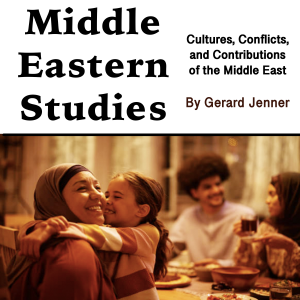

Middle Eastern Civilization
Gerard Jenner
This audiobook is narrated by a digital voice.
The Middle East stands as one of humanity's most significant crossroads, a region where three continents converge and where the earliest civilizations first flourished along the banks of great rivers. This geographic positioning between Europe, Asia, and Africa has shaped the region's destiny as a bridge between worlds, a meeting place of cultures, religions, and empires that continues to influence global affairs today. Understanding the Middle East requires grappling with this fundamental reality of geographic centrality and its profound implications for the region's historical development and contemporary challenges.
The term "Middle East" itself reflects a Western perspective, originally coined by British naval strategist Alfred Thayer Mahan in 1902 to describe the region between the "Near East" of the Ottoman Empire and the "Far East" of China and Japan. This nomenclature reveals the colonial context in which much Middle Eastern studies developed, highlighting the importance of examining the region through multiple lenses that include indigenous perspectives and narratives. Alternative terms like "Southwest Asia" or the Arabic "al-Mashriq" and "al-Maghrib" offer different conceptual frameworks that emphasize regional rather than external viewpoints.
Geographically, the Middle East encompasses the vast expanse from Morocco in the west to Iran in the east, from Turkey in the north to Yemen in the south, though scholars debate the precise boundaries. This region includes the Arabian Peninsula, the Fertile Crescent, Anatolia, the Iranian Plateau, and North Africa, each with distinct topographical features that have influenced settlement patterns, economic development, and political organization. The presence of major mountain ranges like the Zagros, Taurus, and Atlas Mountains has created natural barriers and corridors that shaped migration routes and cultural exchange patterns throughout history.
Duration - 48m.
Author - Gerard Jenner.
Narrator - Digital Voice Parag G.
Published Date - Wednesday, 22 January 2025.
Copyright - © 2025 Gerard Jenner ©.
Location:
United States
Networks:
Gerard Jenner
Digital Voice Parag G
Freegulls Publishing House LLC
English Audiobooks
Findaway Audiobooks
Description:
This audiobook is narrated by a digital voice. The Middle East stands as one of humanity's most significant crossroads, a region where three continents converge and where the earliest civilizations first flourished along the banks of great rivers. This geographic positioning between Europe, Asia, and Africa has shaped the region's destiny as a bridge between worlds, a meeting place of cultures, religions, and empires that continues to influence global affairs today. Understanding the Middle East requires grappling with this fundamental reality of geographic centrality and its profound implications for the region's historical development and contemporary challenges. The term "Middle East" itself reflects a Western perspective, originally coined by British naval strategist Alfred Thayer Mahan in 1902 to describe the region between the "Near East" of the Ottoman Empire and the "Far East" of China and Japan. This nomenclature reveals the colonial context in which much Middle Eastern studies developed, highlighting the importance of examining the region through multiple lenses that include indigenous perspectives and narratives. Alternative terms like "Southwest Asia" or the Arabic "al-Mashriq" and "al-Maghrib" offer different conceptual frameworks that emphasize regional rather than external viewpoints. Geographically, the Middle East encompasses the vast expanse from Morocco in the west to Iran in the east, from Turkey in the north to Yemen in the south, though scholars debate the precise boundaries. This region includes the Arabian Peninsula, the Fertile Crescent, Anatolia, the Iranian Plateau, and North Africa, each with distinct topographical features that have influenced settlement patterns, economic development, and political organization. The presence of major mountain ranges like the Zagros, Taurus, and Atlas Mountains has created natural barriers and corridors that shaped migration routes and cultural exchange patterns throughout history. Duration - 48m. Author - Gerard Jenner. Narrator - Digital Voice Parag G. Published Date - Wednesday, 22 January 2025. Copyright - © 2025 Gerard Jenner ©.
Language:
English
Middle Eastern Civilization
Duration:00:48:07